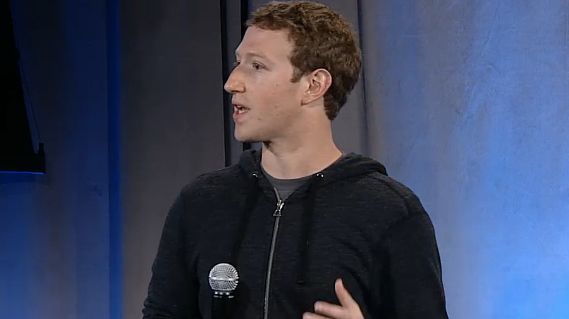Facebook's Zuck thinks we'll send emotions to each other telepathically
Doesn't think the machines will win

Sign up for breaking news, reviews, opinion, top tech deals, and more.
You are now subscribed
Your newsletter sign-up was successful
Facebook creator Mark Zuckerberg reckons that telepathy is the future of the social network.
The site's founder hosted a Q&A session on Facebook where he answered several queries from users and celebrities. One of the most interesting takeaways from the session was his thoughts on the future of social networking.
"One day, I believe we'll be able to send full rich thoughts to each other directly using technology," he said. "You'll just be able to think of something and your friends will immediately be able to experience it too if you'd like."
Zuck added that "we'll have the power to share our full sensory and emotional experience with people whenever we'd like."
There was also a question regarding what Facebook is doing with artificial intelligence, to which Zuckerberg responded:
"Our goal is to build AI systems that are better than humans at our primary senses: vision, listening, etc.
"For vision, we're building systems that can recognize everything that's in an image or a video. This includes people, objects, scenes, etc. These systems need to understand the context of the images and videos as well as whatever is in them."
Sign up for breaking news, reviews, opinion, top tech deals, and more.
For listening and language, we're focusing on translating speech to text, text between any languages, and also being able to answer any natural language question you ask."
Real talk
A number of celebs "dropped in" for the Q&A including Arianna Huffington, Arnold Schwarzenegger (who asked if the machines will win - Zuck said no) and Stephen Hawking. But it was perhaps the question on Facebook's real-name policy that people were most interested to see a response to.
Currently, Facebook won't let people use adopted names, potentially putting some people - particularly transgender users - at risk of abuse. It's a particularly important topic following the US Supreme Courts ruling in favour of marriage equality.
"There is some confusion about what our policy actually is," said Zuckerberg. "Real name does not mean your legal name. Your real name is whatever you go by and what your friends call you. If your friends all call you by a nickname and you want to use that name on Facebook, you should be able to do that."
"In this way, we should be able to support everyone using their own real names, including everyone in the transgender community. We are working on better and more ways for people to show us what their real name is so we can both keep this policy which protects so many people in our community while also serving the transgender community."
Although Zuckerberg said Facebook was working to improve matters, his response suggested that the policy would not be changing any time soon - the main reason being user safety, he said.
"We know that people are much less likely to try to act abusively towards other members of our community when they're using their real names. There are plenty of cases - for example, a woman leaving an abusive relationship and trying to avoid her violent ex-husband - where preventing the ex-husband from creating profiles with fake names and harassing her is important. As long as he's using his real name, she can easily block him."

Hugh Langley is the ex-News Editor of TechRadar. He had written for many magazines and websites including Business Insider, The Telegraph, IGN, Gizmodo, Entrepreneur Magazine, WIRED (UK), TrustedReviews, Business Insider Australia, Business Insider India, Business Insider Singapore, Wareable, The Ambient and more.
Hugh is now a correspondent at Business Insider covering Google and Alphabet, and has the unfortunate distinction of accidentally linking the TechRadar homepage to a rival publication.